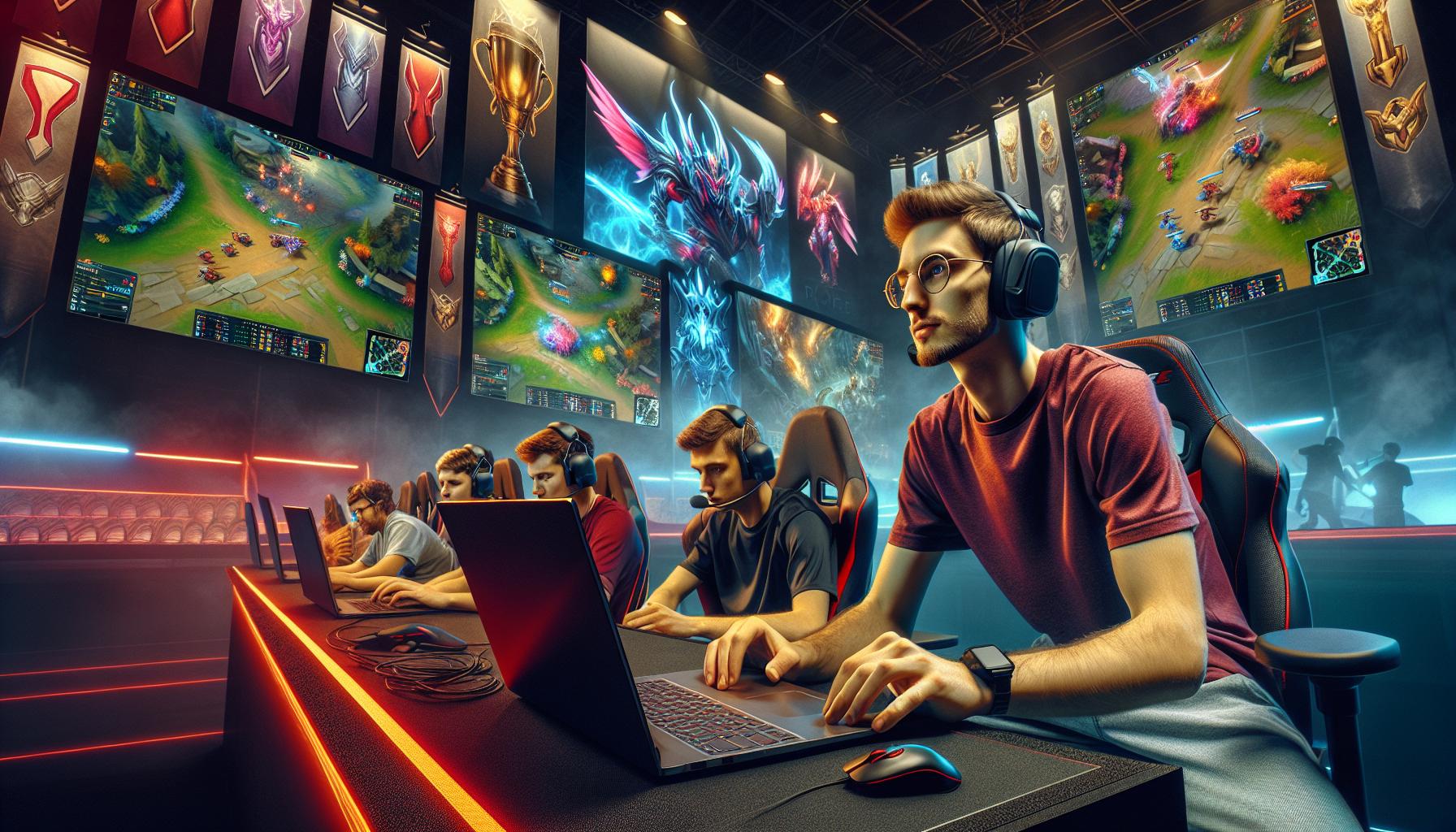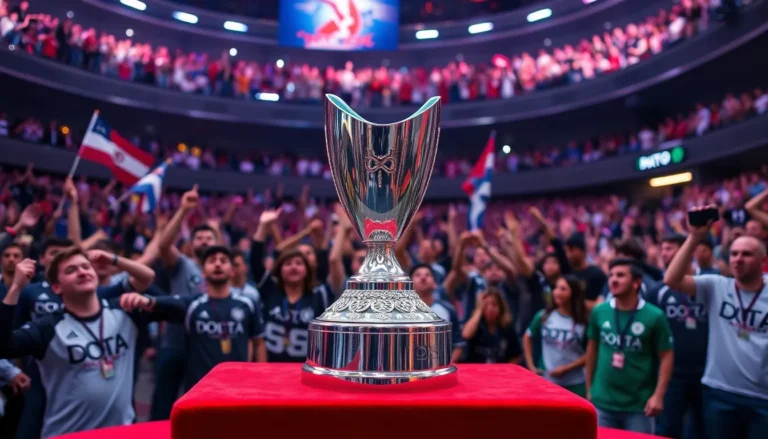In the realm where gaming meets strategy, fantasy esports has emerged as the ultimate playground for competitive thrill-seekers. Picture this: assembling your dream team of virtual champions while enjoying the exhilarating rush of real-time matches. It’s like being a coach in the world of sports—except you don’t have to deal with sweaty locker rooms or post-game interviews.
Overview Of Fantasy Esports
Fantasy esports combines gaming with strategic planning, enabling participants to create their own teams made up of professional players. Users select athletes based on performance metrics, forming virtual squads to compete in ongoing tournaments. Participants earn points as real-world player statistics accumulate during events, fostering an engaging experience.
Platforms dedicated to fantasy esports offer various formats, such as daily and season-long contests. Daily contests attract enthusiasts seeking quick participation, while season-long leagues appeal to those preferring deeper engagement over time. Each format encourages users to analyze player performance trends and adapt strategies.
Players often interact through chat rooms or forums, sharing insights and discussing strategies. Community engagement enhances the enjoyment, creating a social aspect that mirrors traditional sports fandom. In this environment, successful managers frequently rely on research and statistics to determine optimal lineups.
Prize pools vary significantly among contests, with some offering substantial rewards. Competitive structures provide opportunities for all skill levels, from casual fans to seasoned strategists. These elements contribute to the growing appeal of fantasy esports.
Educational resources abound, helping new participants understand scoring systems and player evaluations. Websites and platforms present tutorials and guides to assist users in mastering the nuances of fantasy esports. This knowledge fosters skill development and confidence in decision-making.
As the fantasy esports scene grows, partnerships with real-world esports leagues enhance visibility. Major tournaments and games attract audiences while simultaneously elevating fantasy participation. This interconnected growth highlights the dynamic nature of fantasy esports and its established place within the gaming community.
Popular Fantasy Esports Games

Fantasy esports features several popular games that attract players. Here are three notable titles to explore.
Game 1: League of Legends
League of Legends stands as a cornerstone in the fantasy esports realm. Players draft their teams based on professional league performances, focusing on champion selections and player stats. Participants earn points as their chosen players succeed in matches and tournaments, adding an extra layer of strategy. Utilizing in-game metrics like kills and assists, managers refine their lineups each week. Seasonal leagues often provide depth, while daily contests cater to those wanting quick participation. Community discussions enhance understanding of strategies and techniques, making it accessible for newcomers.
Game 2: Dota 2
Dota 2 offers a unique fantasy experience with its deep gameplay mechanics. Players select heroes and professional competitors to assemble their dream teams, impacting their scoring based on in-game actions. Key performance indicators such as gold earned and objectives completed contribute significantly to point totals. The diverse roster of characters provides endless combinations for team building. Players can engage in seasonal challenges or shorter contests, accommodating different commitment levels. Forums and chats enable strategic exchanges, fostering a collaborative environment among users.
Game 3: Counter-Strike: Global Offensive
Counter-Strike: Global Offensive presents an engaging twist to fantasy esports. Teams compete in matches, and players choose professional athletes to form their fantasy lineups. Scoring is based on individual player performances, such as kills, deaths, and round wins. Participants closely monitor player stats to optimize their choices in real time. Numerous platforms offer different contest formats, ensuring options for both casual and dedicated fans. Regular updates keep users informed about player form, enhancing strategic decision-making for team managers.
How Fantasy Esports Works

Fantasy esports engages users in assembling virtual teams of professional players. Participants compete by selecting athletes based on performance data and player statistics.
Drafting Players
Drafting players involves a strategic selection process. Managers analyze player statistics to determine who might perform best in upcoming matches. Users often consider factors such as individual performance metrics, team synergy, and recent game trends. Different platforms may offer various options for drafting, including snake drafts and auction formats, allowing for diverse approaches to team assembly. Flexibility in choosing players enhances the competition, as managers adapt their strategies based on real-time information and team dynamics.
Scoring System
The scoring system in fantasy esports is crucial for determining team success. Points are awarded based on individual player achievements during matches. Typical scoring categories include kills, assists, deaths, and objective completions, though specifics may vary by game. Users earn points as their drafted players showcase their skills and contribute within the game. Detailed explanations of the scoring system are often provided by platforms, helping newcomers understand how their teams accumulate points and compete against others. By grasping these mechanics, managers refine their strategies to maximize scoring potential.
Strategies for Success in Fantasy Esports
Success in fantasy esports relies heavily on effective strategies. Focused research and team management play key roles in maximizing performance.
Research and Analysis
Thorough research is essential for making informed decisions. Analyze player statistics, including past performances, injury reports, and team dynamics. Consider the performance metrics of professional players and track trends over time. Gathering this data allows managers to identify potential breakout stars and avoid underperformers. Utilize tools and resources from dedicated fantasy esports websites to stay updated on player scores and projections. Consistent analysis of match schedules and potential matchups reveals critical insights that can influence lineup decisions.
Managing Your Team
Properly managing a fantasy esports team is fundamental for maintaining competitiveness. Regularly review lineups, adjusting based on player performances and any changes in team rosters. Engage with community forums for advice and to exchange strategies with other players. Emphasize communication with teammates, especially in joint contests, to create a cooperative strategy. Understanding when to make bold moves, such as trading players or picking up free agents, can provide an edge. Prioritize flexibility and adaptability, as changes in the competitive landscape can necessitate rapid adjustments to maximize scoring potential.
Conclusion
Fantasy esports offers a thrilling way for fans to engage with their favorite games while showcasing their strategic prowess. By assembling virtual teams and competing based on real-world player performance, participants experience the excitement of being a coach without the pressures of traditional sports.
The community aspect enriches the journey, providing a platform for sharing insights and strategies. As the fantasy esports landscape continues to evolve, its growing partnerships with established esports leagues enhance its visibility and appeal.
With various formats and games to choose from, players of all skill levels can dive into this captivating world. By leveraging research and adapting strategies, managers can maximize their teams’ potential and enjoy the dynamic nature of fantasy esports.




